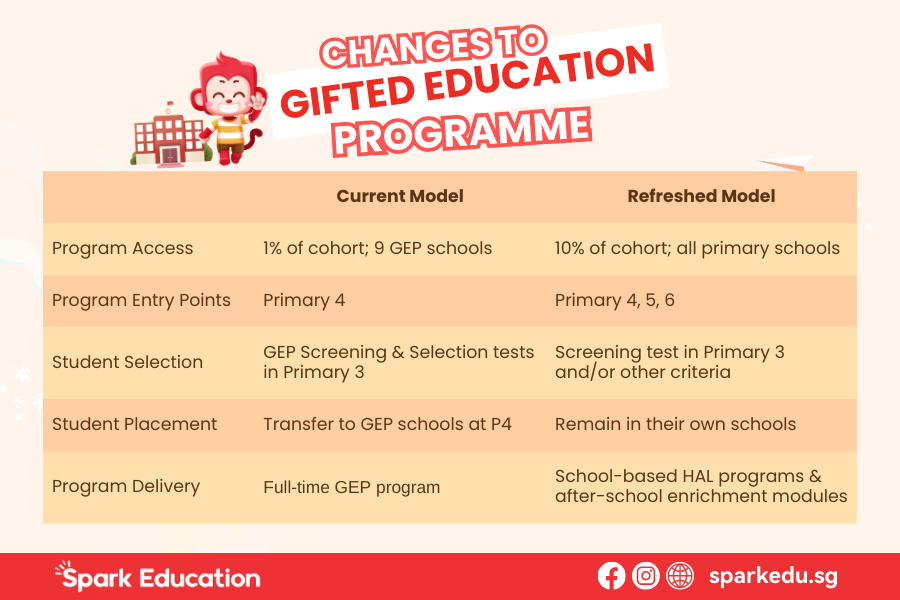Singapore’s Gifted Education Program (GEP) is undergoing a significant transformation to create a more inclusive and personalized approach for nurturing high-ability students. This article outlines the key changes, their implications, and the potential benefits for students, parents, and the education system.
Key Changes to the Gifted Education Program (GEP)

Notable changes
- Expanded Access: Now, about 10% of primary school students can participate in school-based programs for high-ability learners, up from the previous 1%.
- No More School Transfer: Selected students will stay at their current schools, allowing them to maintain connections with their peers while receiving specialized support.
- Flexible Identification: High-ability learners can be identified from Primary 4 to 6, enabling late bloomers to be recognized and ensuring a fairer selection process.
- Holistic Assessment: Selection will now also depend on teacher observations, student work, and school-based assessments, offering a broader view of each student’s abilities.
The Implementation Timeline
The existing Gifted Education Program (GEP) will end after the 2025 Primary 3 students enter Primary 4 in 2026.
A new system for identifying and supporting high-ability students will start with the 2024 Primary 1 cohort.
The Revised GEP Selection Process
The selection process for the revised Gifted Education Program (GEP) is more holistic:
- Primary 3 Assessment: Students will still take standardized tests in English and Math.
- Ongoing Teacher Observations: Teachers will monitor students throughout the year to assess their abilities and interests.
- Teacher Recommendations: Teachers will play a key role in identifying potential candidates for high-ability programs.
- Multiple Entry Points: Students can be selected for programs from Primary 4 to 6, providing more chances for late bloomers.
Benefits of the Revised GEP
The revised Gifted Education Program (GEP) brings several potential advantages:
- Increased Equity: More students will have opportunities to develop their talents, aiming for a more equitable education system.
- Reduced Stress: By eliminating the need for school transfers and allowing flexible identification, the process will be less stressful for students and families.
- Personalized Support: School-based programs will be tailored to fit students’ individual needs and interests.
- Enhanced Social-Emotional Development: taying in their own schools will help high-ability students strengthen social connections and emotional well-being.
Singapore GEP: A 40-Year Journey

The MOE Gifted Education Program (GEP) in Singapore is a highly selective program established 40 years ago with the aim of identifying and nurturing exceptionally gifted students. The program was designed to provide the top 1% of students with a specialized curriculum tailored to their unique abilities and potential. The objective was to develop future leaders capable of making significant contributions to Singapore’s socioeconomic development.
Over the past four decades, the GEP has demonstrated its effectiveness in cultivating a cohort of high-achieving individuals who have excelled in various domains, including academics, arts, and leadership. These students have consistently represented Singapore with distinction in international competitions and have made substantial contributions to the nation’s intellectual and cultural capital.
However, as time went on, some issues with this policy began to surface.
- Students selected for the GEP were required to transfer to one of the nine designated schools, forcing them to leave their familiar environment and adapt to new classmates and surroundings.
- The unequal distribution of educational resources became a major concern. Students in the GEP had access to better resources, creating a gap in educational opportunities for other students.
- The program also placed immense pressure on students and parents. Many parents invested heavily in tutoring and enrichment programs to give their children an edge, leading to a stressful childhood for some. Additionally, the program was designed for naturally gifted students, and not all students placed in the GEP were able to keep up.
What Lies Ahead for Singaporean Education

So, what specific changes will Singapore’s primary education system experience as a result of these policy adjustments or the potential cancellation of the Gifted Education Program (GEP)?
- Schools will undergo significant transformations in their teaching methods and curriculum. Previously, schools tailored specific advanced courses to meet the demands of the GEP. Now, they’ll need to readjust their curricula to cater to all students, emphasizing holistic development and innovation. This requires teachers to adopt new teaching methods and philosophies to better nurture each student’s potential.
- For students, this change is undoubtedly liberating. Without the pressure of GEP selection in the first three years, children can explore their interests more freely and enjoy the learning process. Every child will have an equal opportunity to showcase their talents, regardless of academic performance or perceived giftedness. This fosters self-confidence and independent learning, promoting overall growth.
- Parents will also benefit from these changes. Freed from the anxiety of GEP selection, they can focus more on their children’s well-being and personal development. This can lead to more harmonious family relationships and a supportive environment for children to thrive.
Challenges Ahead
While the changes to Singapore’s primary education system hold promise, the transition away from the Gifted Education Program (GEP) is not without its challenges.
- Identifying and nurturing gifted students: Without the structured GEP selection process, schools will need to develop more effective methods for identifying and supporting students with exceptional abilities. Teachers will need to be attuned to recognizing the unique talents of their students and providing appropriate guidance and support.
- Ensuring equitable distribution of resources: To avoid creating new inequalities, it is crucial to allocate resources fairly across all schools. This requires increased government investment in education and optimized resource allocation to ensure that every school has sufficient staff, facilities, and resources to provide a quality education for all students.
In conclusion, the adjustment of Singapore’s primary Gifted Education Program (GEP) selection policy marks a significant milestone in the nation’s education history. It signifies a new era for primary education, one that prioritizes equity, holistic development, and individualized learning. While challenges may arise during implementation, with concerted efforts from the government, schools, parents, and the community, we can create a brighter educational future for all children.
Common Concerns from Parents

- Are the PSLE and DSA the only ways to identify gifted students in primary school now?
Many parents and teachers are wondering if this means there will be no other programs to identify high-achieving students in primary school besides the PSLE and DSA. Not quite.
As stated in the National Day Rally 2024, “So we will discontinue the current form of the GEP in primary schools. We will replace it with a new approach to stretch students with higher abilities across all our primary schools.”
This suggests a shift towards a more inclusive approach. The new system will identify and support high-ability students in all schools, rather than concentrating them in a select few. Existing programs like E2K will continue to provide enrichment opportunities for gifted students in math and science.
- How will selected students develop their talents?
“We will equip the schools to identify their own high-ability learners, so this will benefit more students. Every primary school will have its own programmes to stretch these students in their areas of strength and interest. So students will continue in their own primary schools,” stated in the National Day Rally 2024.
The focus will be on empowering schools to identify and nurture their own talented students. This means that students can remain in their current schools and benefit from programs tailored to their individual needs and interests.
However, parents and students who were hoping to access the specialized programs and resources offered by the Gifted Education Program (GEP) may need to adjust their expectations.
The goal of this policy change is to create a more equitable education system for all students. While this is a positive development, it is important to recognize that achieving true equality will require ongoing efforts.
- School-Based Programs vs. After-School Modules?
School-based programs are part of a student’s regular school day and aim to foster a general strength. After-school modules offer specialized, in-depth learning for students who have shown particular aptitude in a subject.
School-based programs focus on developing a student’s strengths within the regular school day.
- Goal: Encourage exploration and inquiry to develop a student’s strength in a specific subject area, such as science or math.
- Example: a science program where students explore how to cool hot tea, leading to the discovery of Newton’s law of cooling.
After-school modules offer deeper dives into specific subjects beyond the regular curriculum.
- Goal: Provides specialized learning opportunities for students with similar interests.
- Example: A science module focused on the science behind food and sustainable eating practices.
- These modules will typically occur once a week, but students with multiple strengths may attend more frequently.
What Does This Mean for Parents?

At first glance, this news might lead parents in Singapore and elsewhere to wonder, “Is primary education in Singapore going to be less competitive?” or “Is the whole world moving towards a less stressful education system?”
As we’ve discussed, competition is a constant in any environment where people are involved. It may change form, but it won’t disappear entirely.
It’s crucial for children to equip themselves with the necessary skills and knowledge to have more opportunities. They should seize every chance to showcase their strengths and talents to their teachers and schools. Regret sets in when students realize too late that they could have done more, especially when facing major milestones like primary school graduation, the PSLE exam, or seeing their peers secure spots in top secondary schools through the DSA.
We will continue to monitor these significant changes in Singapore’s primary education and look forward to seeing how they create more opportunities for children. Our hope is that every child can thrive and shine in this new environment.
Spark Math by Spark Education
Spark Math Advanced Program
Designed to cover 100% of the MOE syllabus plus 20% math enrichment, Spark Math’s Advanced Program focuses on strengthening core mathematical concepts and problem-solving skills.
This program can be seen as a valuable extension of school-based programs, providing students with additional opportunities to deepen their understanding and build math confidence. Students also develop critical thinking and problem-solving skills through solving challenging questions.
Spark Math Competition Program
For students with a particular aptitude for math and a competitive spirit, Spark Math’s Competition Program offers a platform to excel. This program is akin to the after-school modules, providing in-depth exploration of advanced math topics.
Key benefits of the Competition Program include:
- Mastering advanced concepts beyond the regular curriculum, preparing them for math competitions.
- Exposure to challenging problems to develop creative and efficient approaches.
- Building resilience and ability to handle challenges through math competitions.
Spark Math fosters critical thinking, problem-solving, and advanced math skills, building confidence and resilience for future academic and career pursuits.
2023 International Competitions:
- AMC 8: One-third of Spark Math students ranked in the top 1%
- Math Kangaroo: 31.3% placed in the top 20%
- Caribou Contests: Half of the students scored full points
- SASMO: One student achieved a perfect score; 81% received awards
2023 Gifted Education Preparation
- 88.3% of Spark Math students passed the Singapore Ministry of Education’s Gifted Education Programme Screening Test, well above the national average.
Spark Math by Spark Education is a MOE-aligned online math program designed to make learning math engaging and effective. With interactive lessons, personalized learning pathways, and experienced teachers, Spark Math helps students of all ages build a strong foundation in math and develop a lifelong love for the subject. Sign up for a FREE online trial class to see the difference today.




